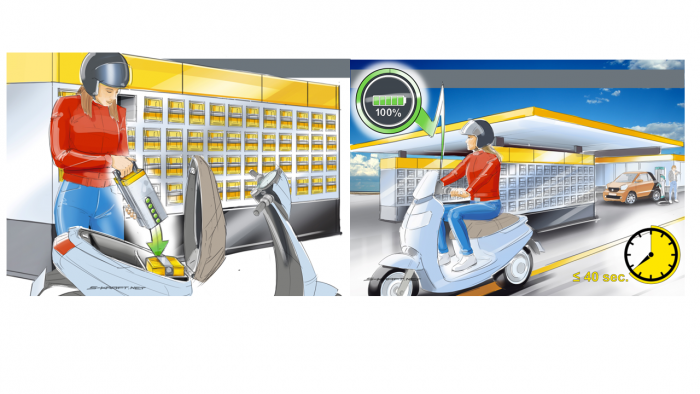
Urban mobility is going through a challenging transition towards electrification where the widespread adoption of electric motorcycles can play an important part in realising a more sustainable society. Indeed, scooters and motorbikes could contribute to decreasing the number of cars, reducing congestions and making towns smarter and more sustainable.
In this framework, the Swappable Batteries Motorcycle Consortium (SBMC) is fully committed to the promotion of the widespread use of light electric vehicles, such as mopeds, scooters, motorcycles, tricycles and quadricycles (L-category).
Created in February 2022, by Piaggio, Honda, KTM and Yamaha, this consortium brings together different actors such as motorcycles manufacturers, battery producers and energy providers. In particular, Suzuki, Samsung, Polaris, Fivebikes, Niu, Roki, Forsee Power, Swobbee, Hyba, Sinbon, Hioki, Sumitomo Electric, Venetwork (Fantic, Atex), Vitesco, JAMA and AVL joined the consortium few months after the four founders.
The main goals of SBMC are to:
- Develop common technical specifications of the swappable battery systems
- Confirm common usage of the battery systems
- Make and promote the Consortium’s common specifications towards standardization within European and International standardization bodies for interoperability, compatibility and harmonisation of the systems
- Expand the use of the Consortium’s common specification to global level
Furthermore, the underlying aim of the consortium is to find solutions to the concerns customers may have regarding the future of electromobility, such as the range, the charging time and infrastructure, and costs.
By working closely with interested stakeholders and National, European, and international standardization bodies, members will propose to create open international technical standards. While the availability of charging stations varies between countries and with still limited information for end users, SBMC can help unify the differing technical specs and standards and contribute to maximizing the merits of electric power for customers around the world. It also aims at engaging the decision makers for the development and deployment of charging infrastructure to promote the increase of light electric vehicles and consider Cities and communities’ expectations and needs for cooperating towards carbon neutral cities.
SBMC members look very much forward to ensuring that powered two-wheeler vehicles will maintain their role in the future of both urban and non-urban areas and they encourage all interested stakeholders to join the cooperation and enrich the Consortium’s expertise. Parties who are interested to join the SBMC can contact one of the members or the coordinator (sbmc@n-able.io) for further information.
